How Strategic Content Fuels Growth in Purpose-Led Ventures This episode explores how thought leadership can…
Thought Leader Publicity for Authors | Sandra Smith
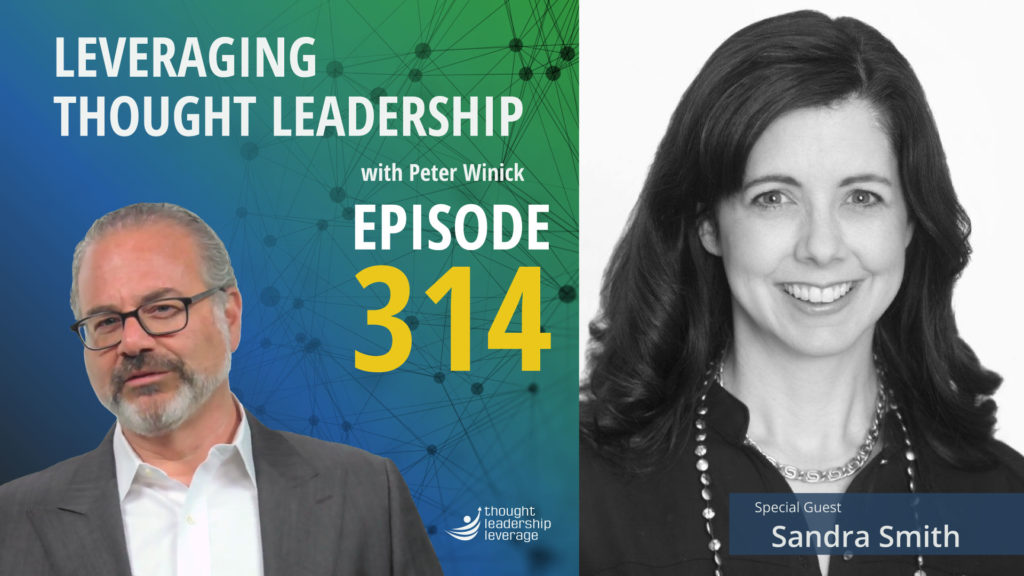
Publicity strategies for thought leadership authors.
An interview with Sandra Smith about publicity for authors that go beyond the book and deep into the entire business.
Today’s guest is Sandra Smith, Founder, and President of Smith Publicity a marketing company that focuses on authors and expert promotions.
Many things have changed in the last ten years and publicity is no different. Sandra walks us through some of the big changes authors should be conscious of. She explains why their social media presence and what they share are more imperative now than ever before.
When it comes to success for an author, selling books seems like the logical focus. We discuss why selling books is great but getting the attention of your industry is even better. Sandra explains why authors don’t need to be overly concerned with metrics and how the shelf life of business books is much longer than it used to be.
Sandra goes on to explain why authors should start a conversation with a publicist before they start writing. Getting a firm grasp on why you want a narrow audience, how your release date isn’t that important and the benefits of hiring a publicist outside of your publisher can save time and money down the road.
If you are thinking about writing a business book and want to ensure success, this episode is a great place to start!
Three Key Takeaways from the Interview
- You need to be sharing your thought leadership content and cultivate your social media presence all the time not just when you have a book coming out.
- Authors often get fixated with the metrics around the publication date of their book. But thought leadership books often do better in their second year than their first.
- Getting media attention for your thought leadership is good but you have to make sure you have content and systems in place to monetize the spotlight.
If you need a strategy to bring your thought leadership to market, Thought Leadership Leverage can assist you! Contact us for more information. In addition, we can help you implement marketing, research, and sales. Let us help you so you can devote yourself to what you do best.
Transcript
Peter Winick And welcome, welcome, welcome, this is Peter Winick, I’m the founder and CEO at Thought Leadership Leverage, and you’re joining us on the podcast today, which is Leveraging Thought Leadership today. My guest is Sandy Smith. Sandy is the founder of Smith Publicity, which is a firm that focuses on book marketing and book promotions. They’ve worked with lots of New York Times authors and independently published authors. She’s been at this for quite some time since 1997, actually. And this will be fun. So let’s just dove in here, Sandy. So book marketing, book publicity PR. So it’s something that almost all of my clients deal with or need to deal with or should deal with, etc.. Let’s start here. What is totally different today than even 10 or 15 years ago? Because sometimes I see people coming at this from a playbook that I was like, Oh, that’s 10 years ago. Like, that was a great idea. But dot dot dot. So what’s like sort of cutting edge of works best today?
Sandy Smith Today, it’s all about sharing content and social media profiles in terms of getting, you know, especially podcast, you know, our podcast. People will say, Can you get me on Joe Rogan? And it’s like, OK, let’s look, let’s look at your profile and we have people on Joe Rogan. It’s not an impossible thing, but it’s akin to winning a lottery, of course. And then, you know, you look at their social media platforms and they have Twitter, and they haven’t posted anything in five years. Or they’ll have a blog and it’s, you know, it’s like, OK, we’ve got to have build a story here. So, you know, managing your online presence, whether it’s social media or sharing content, is more important than ever before.
Peter Winick And I think consistency, you mentioned, is key because sometimes what will happen is the author writes a book a lot of activity, noise, noise, noise. Then they go into sort of other witness protection program pop out like Groundhog Day four years later, and they haven’t done anything like, OK, Showtime. You have to be doing that regardless of what you’re promoting or why you have to consistently drip your content down in ways that matter.
Sandy Smith Absolutely. And that goes to the point where, especially for nonfiction, book fiction’s a bit of a different conversation, but for nonfiction books, our business experts, our thought leaders. Yup. Know the preorder campaign is very important now, if they want to make those lists the bestseller list. Sure. Wall Street Journal New York Times However, most of our nonfiction experts write their books not because they want to be authors. It’s because they want to become thought leaders. And so their book it’s got a longer shelf life than ever before, which is really –
Peter Winick So stay there for a minute, because I think there’s this huge disconnect between traditional publishing industry thinking. So the publishing world, my experience looks at a book as a seasonal item. Oh, that’s a spring release or fall release, like it was a skirt or a bathing suit or a sweater. And to the author who spent blood, sweat and tears. It’s like that is an asset that should serve you well for five years, seven years, whatever the case may be, right? It’s a little bit more evergreen. And what we’re starting to see now, which is really interesting, is more nonfiction. More business books are having a better second year than first. It’s not just about batting, launch it and go home, which is what the publisher wanted to do. So talk to me about that because I think a lot of people get obsessed with this.
Sandy Smith Right, the launch date and our vice president Mike Onorato. He comes from traditional publishing. He was actually a client of ours, and he’s been working with us for years now. And you know, one of the things he said is like, authors are so fixated on the pub date and then the metrics aren’t there in the pub date, their ego just is crushed.
Peter Winick And I was I was having this conversation with someone the other day where I asked them, What are your five favorite books of all time? And it was like good to great and then search back to, you know, the classic sort of nonfiction books. I said, you’re the pub date of any of them, and they sort of look at me. I’m like, That’s the point right now. If you’re writing about, you know, the election that happened six months ago, yeah, then it would matter. But a publisher is this is irrelevant. And I think if you start getting out of the mindset, Oh, but I’m a May 7th or whatever.
Sandy Smith Exactly, exactly. Because that is it’s important for the publisher, but for the author, you know, and the media, which is a workhorse where we wear our hats, the media doesn’t care about your publication date or you have to say this to authors like what kind of coverage am I going to get on my my publisher? And yes, we do that, and that’s a goal. But, you know, Fast Company might not be covering your topic until June, July, August, the following February. They don’t care about the publication date. Get it. Frankly, they don’t care that you wrote a book. What they do. They don’t, they don’t. There are thousands of come out every day books, every day in nine states alone. What they care about is that you have something of value to share with their readers, listeners, viewers. And the book always comes along for the ride, and it’s great credibility and obviously just something fantastic to share. But having a new book is always great, but it’s more the content which goes back to what I said earlier is if you’re an expert, you’ve got the credibility and you have an online presence that is sharing and has that final. That’s more important. Now, going back to your original question than 10 years ago. It’s that the book is much more evergreen than ever before. It’s not that that pub date and over, OK, six months, it’s collecting dust and I have to work on my next one. That’s not the case.
Peter Winick How do you deal with – and I always ask clients to think about this. There is a natural tension. Between a publisher and an author, and if you’re self-published, it’s different, because you are the publisher in that case, are you leaving out of these stressors? Right? So ultimately, there’s a period of time this brief moment, almost like an eclipse where everybody’s objectives are aligned. We want to sell more books, right? And then we’re not alone. Right. So so I’ve had far too many conversations with some really, really, really smart folks that have know put together some amazing books. And I call it the postpartum conversation. It’s, you know, four or five months after launch, you say, have that go? And that really bummed out because they are their little OCD with hitting Amazon and watching their numbers like literally in real time, like it’s the journal every day.
Sandy Smith Yes.
Peter Winick Not that I’m doing this, but you know, I was at number three thousand five hundred seventy two yesterday and now that, you know, it’s like, OK, stop, you know, touch on that for a little bit. How do you avoid that postpartum of after a an investment of time, energy and money for you are that the client is satisfied? You know, like it’s about getting clear on goals, I guess, but –
Sandy Smith You’re exactly right. When we talk to authors, it can be, you know, two months after the pub date, two years before the pub date, anywhere in between. The first question I say, well, one of the first questions is help me understand how you define success. Three months after pub date, a year after, how are you going to feel that your investment with us or this whole book is is a success? And their answer usually is, I haven’t really thought about that.
Peter Winick So and that’s a strategy question, quite frankly, because I guess I asked the same question and first I get the look and I’m like. So a lot of books are like, who cares? Like for what? So five thousand books, big deal, ten thousand books, big deal, you know, like, then what? And then they realize that they don’t really know that they’ve been caught in this blender. Why did you write the book? What would you just look like for you? Let’s talk about that is is it to build your brand? Is it to open new doors? Is it to whatever? Because there is a lot of that is jargon, but social media metrics that are really vanity metrics. Oh, look, how many retweets you got? Oh, look, how many comments. And unless you know that those are predictive indicators to outcomes and before, it’s really great.
Sandy Smith Yes. So that’s exactly, you know, we dove in deep to your. And this is a great point to your target audience. There could be all these people who could read your book. Well, that’s great. But tell me about your business plan. So you have a book on how to hire the best talent, for example. And then I say, and it might be a, you know, an individual entrepreneur or someone who has a small firm of 10 people or even medium sized firm of 100 200 people. Like you who said, my book is for anyone and I’m like, Fantastic. Now for your business model, what kind of clients are you trying to attract? Because if you say that I am in it for high tech firms or manufacturing, that is more important to me than just anyone in business and anyone in H.R.. Now let’s get to the industry because we’ll say, you know, so you get a nice picture and fast company. Well, that’s wonderful and great name recognition. But let’s look at the trade publications because that’s where your future clients are, and that’s where they’re reading and that’s where they’re getting their influence. So when you break it down like that, when we have the conversations, they might say, I want to be a New York Times best seller. I want to sell 100,000 copies. And then when you kind of walk them through it, it’s like, you know what? Book sales become not important. The social media we treat great, but not important. But I’m looking to grow my business in the with the H.R. tech people.
Peter Winick Yeah, right? Because you can find that audience and one of the things that I say is bad PR is, you know about shooting for the fences. Oh, we want to be on the Today show. Listen, you got the Today show to confirm that. But even just a number of authors on the Today show annually today versus 10 years ago is but a fraction. Right, right. So that’s really the wrong question. It’s a matter of, you know, think, you know, sort of I always talk about sort of hand-to-hand combat. So who are the two hundred people if we got this book in their hands could change your business. It’s like, Oh, okay, we can find that. And sometimes it’s the combination of good PR and good campaigns that are very like, we’re living in the world of the long tail of the world. So, you know, Oprah’s great, you know, if she calls, you take her call, hang up on me. But the reality is, you’ve got to build your own success, you know, niche by niche by networking.
If you’re enjoying this episode of Leveraging Thought Leadership, please make sure to subscribe. If you’d like to help spread the word about our podcast, please leave us a review and share it with your friends. We’re available on Apple Podcasts and on all major listening apps, as well as at Thought Leadership Leverage dot com forward slash podcasts.
Sandy Smith Absolutely. We’ve had offers on the Today Show. We had one on last. We had the cover of People magazine three times in the last year at once last month and have my copy here. That’s all great and it can help book sales. But you know, we had an author who did a parenting book, so it’s a little different of an expert who did one affiliate like NBC. It got picked up by 15 other affiliates. And her book sales went up 10,000. And that week that that was that was kind of amazing because it’s TV, because TV is kind of, you know, you don’t always know, but parenting consumers. It was perfect. But we’ve had other people on the Today Show self-help book didn’t sell one book – no blip – after – it was 8:30 interview. It was. It was nice. Prime time. Nope. No traction at all. Was it great that the author could put as featured on today’s show, fantastic. But we hear that there are certain podcasts that will get not just book sales, but the phone ringing.
Peter Winick Which is the key, which is really the key because most people listen unless you’re, you know, Obama or whatever. Actual book sales really don’t matter whether you sell five, 10 or 15, it’s not that that’s not the point. The trick is what are the doors that that is going to open, you know? And some of this is just basic math. So what’s your average engagement side if you’re a consultant, if you’re a speaker or whatever? How many of those would you need to be impactful to have a difference? And then I think and this is where strategy comes into play. Do you have the right product and offering solution, right? Because a lot of times I’ve got a book that’s 20 bucks or 25 bucks, and then you can hire me as a whatever speaker for twenty five then. And there’s a lot of blank space in the middle. But what’s your average video base?
Sandy Smith Oh, preaching to the choir! Bingo. And that’s a conversation I have to. It’s like, OK, say we get the ideal media for you, whether you want your fast company or that trade publication. What are you going to do with that attention? How are you going to turn that? Like, Hey, I need to talk to Peter into to monetize that? And you can’t go from zero to 100. I want to hire you to consult for $100,000. I want to hire you to speak for $50,000. There’s a lot of steps in between. And then I go to the author’s page and say, I want to speak like, you know, you don’t have speaker anywhere.
Peter Winick Right, right? How would I know that? And I would say as much as somebody may fall in love with you and your content, they’re not going to stay up late at night trying to figure out how to get money in your pocket. They’re just not. You have to make it really, really easy. Like if you say I have to speak and mean seems like an obvious thing. If I go to your website, where’s the speaker button, like duh?
Sandy Smith And it’s good. I sound so brilliant to these people because to you and me, it’s common sense, but to these people who are living in a world that’s not going to believe that. Okay, thank you. But it’s like, you know, they’re brilliant. They’re, you know, Wharton Business experts, and they’re in their niche, and that’s fantastic. But they’re just so brand new to expert branding.
Peter Winick [Sic] – where I’m in book mode. Once I finish the book and get it out, then I’ll think about how I grow my business and I’m like, No, no, no, no, no, no, no. Those things need to be related, and I’m not saying that, you know, the, you know, every three pages in the book it’s click here and buy here. That’s tacky. That’s not what I’m talking about, but you have to think about who those client avatars are and what the journeys of someone get. Then what’s next? Oh, maybe we do advisory work. Maybe there’s a suite of digital tools. Maybe there’s video based training like it has to be logical and you have to sort of plant the seeds of that in the book and think about, you know, you mentioned that sort of content. OK, HR & Tech, what are the 10 problems that they have had? Is that the content that I have in my book solve it? And even if your book – and I think this is where people get hung, too – tells them exactly what they need to do, right? In the seven Habits, one of the best business books of all time. You have Stephen Covey published all seven. Start with that. Like, could you do that on your own? Absolutely. Do people – have people spend hundreds of millions of dollars to hire the Covey organization to implement? They do. Of course they do. And there’s a different market for both. There’s a very, very small percentage of people that will say, Got this book? Wow, game changer. I can implement this on my own. Most can. You know, most of us know how to lose weight, right? But we’re going to hire a trainer. We’re going to like we know them. So I think that’s the whole piece.
Sandy Smith Yes. Yes. You got to give some things away and not be afraid to. You said it perfectly. This is what we do every day is find those headaches. Find what problems you can solve. Show them why your credibility. Why your experience is the right fit for them. And that’s how you’re going to nurture them. So they go to that. I look at their website and author and they have no newsletter. Sign up. They have a blog that’s old. They don’t have them. Their profile set up as a speaker with any type of a real, but they have these goals. So that’s exciting for me. I’m like, All right. We can start you on that path, but having these conversations before we engage with them and publicity is so important because if we don’t know what their goals are and telling them where their holes are, we can get the best publicity in the world. But it’s not going to be valuable to them unless they have a plan to nurture those new eyes and to build their thought leadership and ways. That is not publicity. It’s like, OK, now we can’t. We can lead the horse to water, but we can’t force them to drink so that the author has to have a really strong plan in place if they want to maximize exposure from publicity.
Peter Winick Yeah, no, I love it. So any final thoughts because lots of folks are thinking about, should I write a book? When do I write a book? Where do I deploy PR? When? When should they start thinking about this? You know, some of the things that you’re talking about, like the social media presence getting content out consistently. How does that?
Sandy Smith How does that? I can’t. That’s a great question. Some of I would love every author to have an hour conversation with a publicist before they even write their book ideally right? Because then we’re going to be pushing them on to who should you be talking to? Who is this book really for? What is the goal of this book? Authors tend to write too broad. My book is for everybody, every business, every every. And so if we could get them even before they write their book, that would be great. But if that’s not the case, once they have their publishing plan in place, whether they’re self-publishing or going to a hybrid or traditional publisher, talk to your publicist about the plan because we can say you need to be doing this before publication. You need to be doing this before we even pitch the media. So the more time that we have to kind of set them up for success, the best for it to maximize the long.
Peter Winick I love that. One of the things I’ve heard from a lot of folks after is, well, I just trusted the publicist because, you know, they got came highly recommended and I’m like, No shame on you. You should really. You don’t have to have the level of expertize or domain knowledge that they have. But do you understand the logic that they’re applying? Does it make sense to you what they’re coming at? Some of the tactical like, you know, clubhouse theirs or whatever, they don’t need to go there, but is, you know, a good publicist should be able to articulate. Here is my strategy. Here is the tactics that support it. Here are the things that you told us are your goals. And here’s that if you don’t understand that storyline, if it’s mumbo jumbo, whatever you know, you shouldn’t be putting your money there, right?
Sandy Smith And to a big question to go with that is I have a publicist and my publisher. Should I hire extra help? Yeah. And there’s all kinds of answers there. But what we do, that’s different than an in-house publicist. We look at the author’s complete brand. I don’t care if the book’s three years old. That’s the beauty of talking about. We can pull that in. The publisher, the publicist at a publisher, they’re all about the book, which is fantastic. We’re more about is the personality cultivation of the brand. So the book is there and it’s fantastic -.
Peter Winick You know, they’re all about the book and then eight other authors and their bosses to me. Oh, this author wink wink, you know, give them two hours a week and this one wink wink, give them 20 hours a week because that’s there’s a relative waiting to where they can apply their resources for whatever reasons. Whereas when you’re going out of pocket for an outside PR, you are the rock star, you’re the client.
Sandy Smith You are – you are the rock star, you are the center of attention. And we look at not just the book, but we go beyond the book, which is which is usually more valuable, especially when books are book sales. Always welcome, but it’s a much bigger goal than book sales is what we do.
Peter Winick Yeah, and it’s I think that’s the key point is that it’s an easy, almost lazy metric and it’s not the metrics it’s aiming for.
Sandy Smith A metric. Exactly,
Peter Winick Well, this has been fantastic. Thank you so much for spending time with us today, Sandy and appreciate your…You and I are in violent agreement a lot. So it’s fun, but maybe boring for the listeners. I don’t know, but it’s good stuff.
Sandy Smith Excellent. Well, thank you. Thank you, Peter.
Peter Winick To learn more about Thought Leadership Leverage, please visit our web site at ThoughtLeadershipLeverage.com to reach me directly. Feel free to email me at Peter at ThoughtLeadershipLeverage.com and please subscribe to Leveraging Thought Leadership on iTunes or your favorite podcast app to get your weekly episode automatically.
Comments (1)
Comments are closed.



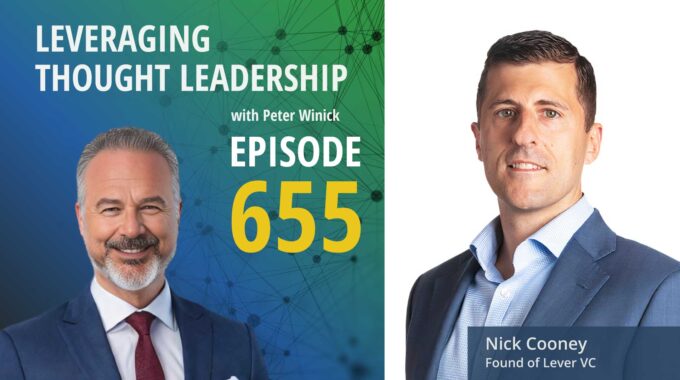
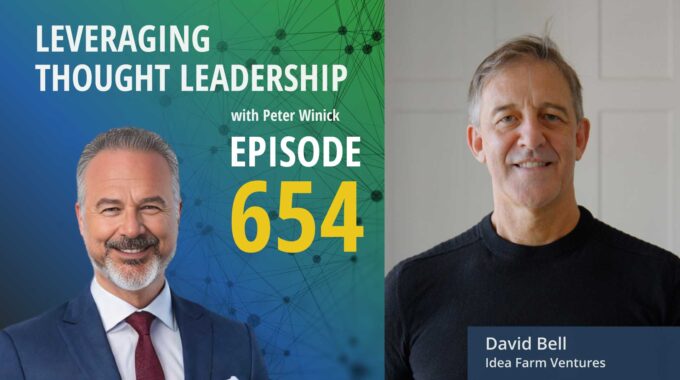
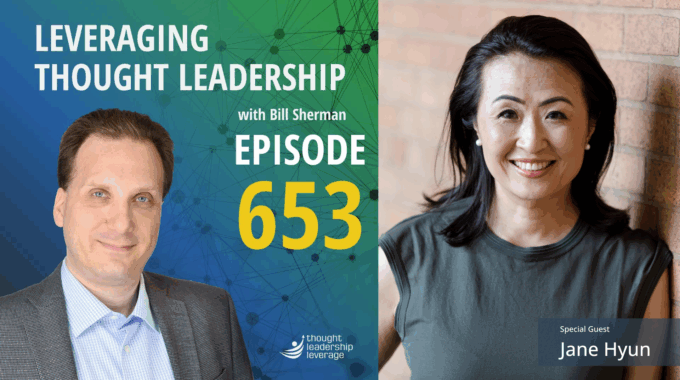
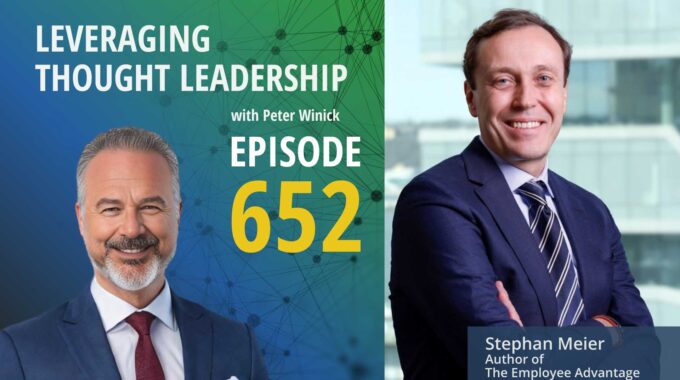
Great tips and advice.